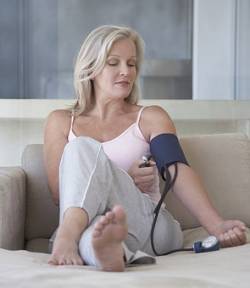 Does having a home blood pressure monitor help lower blood pressure? A new study clearly says: “It actually depends upon who you are.”
Does having a home blood pressure monitor help lower blood pressure? A new study clearly says: “It actually depends upon who you are.”
The researchers gathered two groups of people with high blood pressure. One group had never suffered from stroke while the other had. Everyone was given home blood pressure monitors and asked to measure their blood pressure three times a day.
The study revealed that the group that had already suffered a stroke was able to shave an average of 10 points off their systolic blood pressure, compared to the other group that saw only a 5-point reduction.
Some experts that commented on the study out of Duke University concluded that it may indicate that having a home blood pressure monitor is of little help to those who hadn’t yet suffered a stroke when compared to the other group.
Not so, say other researchers, who cite a review of several clinical studies from 2010 that followed people managing high blood pressure who were given the monitors for home use.
That review uncovered that not only were the home monitor users able to reduce their blood pressure several points more than those who didn’t monitor at home, they were also able to reduce their medication more over time.
The exact reasons for why the monitor-using groups saw more benefits was speculated to be that they were more proactive in getting a hold on their hypertension as compared to the group that didn’t monitor at home.
Studies have also shown that home readings are at least as accurate, if not more accurate, than doctor office readings because they eliminate the “White Coat Syndrome” effect.
If you have high blood pressure, you may want to check out easy exercises that drop blood pressure below 120/80 – sometimes the very first day….

 Multiple Sclerosis
Multiple Sclerosis Banishing Bronchitis
Banishing Bronchitis Gum Disease Gone
Gum Disease Gone Overcoming Onychomycosis
Overcoming Onychomycosis Neuropathy No More
Neuropathy No More The Prostate Protocol
The Prostate Protocol Brain Booster
Brain Booster
 Ironbound
Ironbound
 Solution for Shingles
Solution for Shingles
 The Bone Density Solution
The Bone Density Solution
 The Ultimate Healing Protocol
The Ultimate Healing Protocol
 The Parkinson's Protocol
The Parkinson's Protocol
 The Chronic Kidney Disease Solution
The Chronic Kidney Disease Solution
 Overthrowing Anxiety
Overthrowing Anxiety The Fatty Liver Solution
The Fatty Liver Solution The Hypothyroidism Solution
The Hypothyroidism Solution
 The End of Gout
The End of Gout The Blood Pressure Program
The Blood Pressure Program
 The Oxigized Cholesterol Strategy
The Oxigized Cholesterol Strategy
 Stop Snoring And Sleep Apnea Program
Stop Snoring And Sleep Apnea Program
 The Arthritis Strategy
The Arthritis Strategy The Vertigo & Dizziness Program
The Vertigo & Dizziness Program The 3-Step Diabetes Strategy
The 3-Step Diabetes Strategy Hemorrhoids Healing Protocol
Hemorrhoids Healing Protocol The Erectile Dysfunction Master
The Erectile Dysfunction Master Weight Loss Breeze
Weight Loss Breeze The IBS Program
The IBS Program The Insomnia Program
The Insomnia Program The Migraine and Headache Program
The Migraine and Headache Program The Neck Pain Solution
The Neck Pain Solution The Menopause Solution
The Menopause Solution The Ejaculation Master
The Ejaculation Master The TMJ Solution
The TMJ Solution The Acid Reflux Solution
The Acid Reflux Solution The Fibromyalgia Solution
The Fibromyalgia Solution The Psoriasis Strategy
The Psoriasis Strategy
Please answer this, Christian Goodman – via email preferably. Why do you persist in 120/80 as optimum BP? You of all people will recognise that such a low figure is only thus (low) because Big Pharma wants to sell more drugs! Have you been conned as well? I am 81, my bp is the same as it was 30 years ago – but because of so-called ‘new research’ is now deemed to be too high. Who conducted, and paid for, that ‘new research’? Happy New Year, and best wishes – Richard Senior. PS: I use your MP3 progs, as your records will show you.
Oh no, not in my case. I have W.C.Syndrome and have to do a medical every 2 years to get a driving license. Now ,also at home I suffer W.C.S., although with patience I can get a low reading. I am 83, fully fit never go to Dr’s, don’t trust them. Fortunately I am allowed to present 3 readings done at home.
But still have the same problem. I follow nearly all tips to produce low B.P.
it is like having a car. u feel satisfied that u hv a gadget that is under your control.and that feeling itself helps to lower the bp.
yes,it is like owning a car. the very feeeling that u hv got a gadget to measure the bp helps to lower the bp.